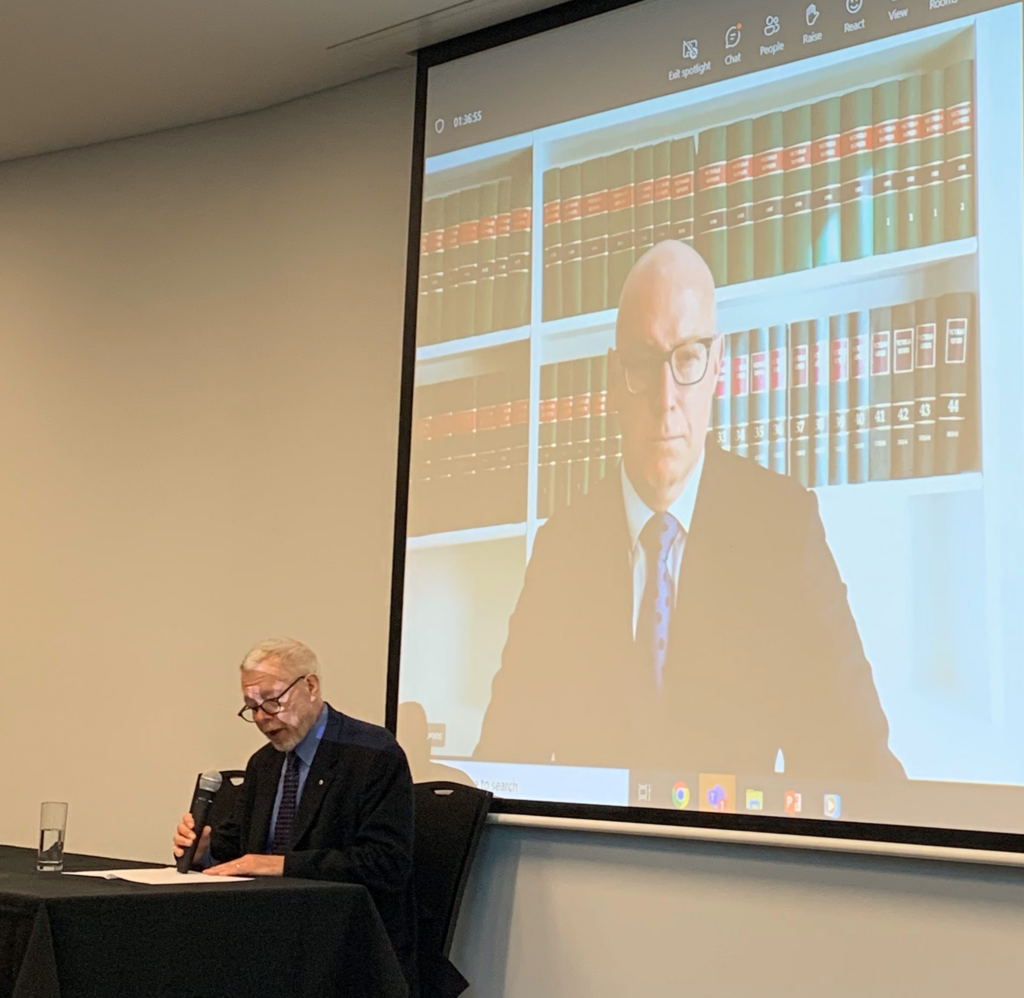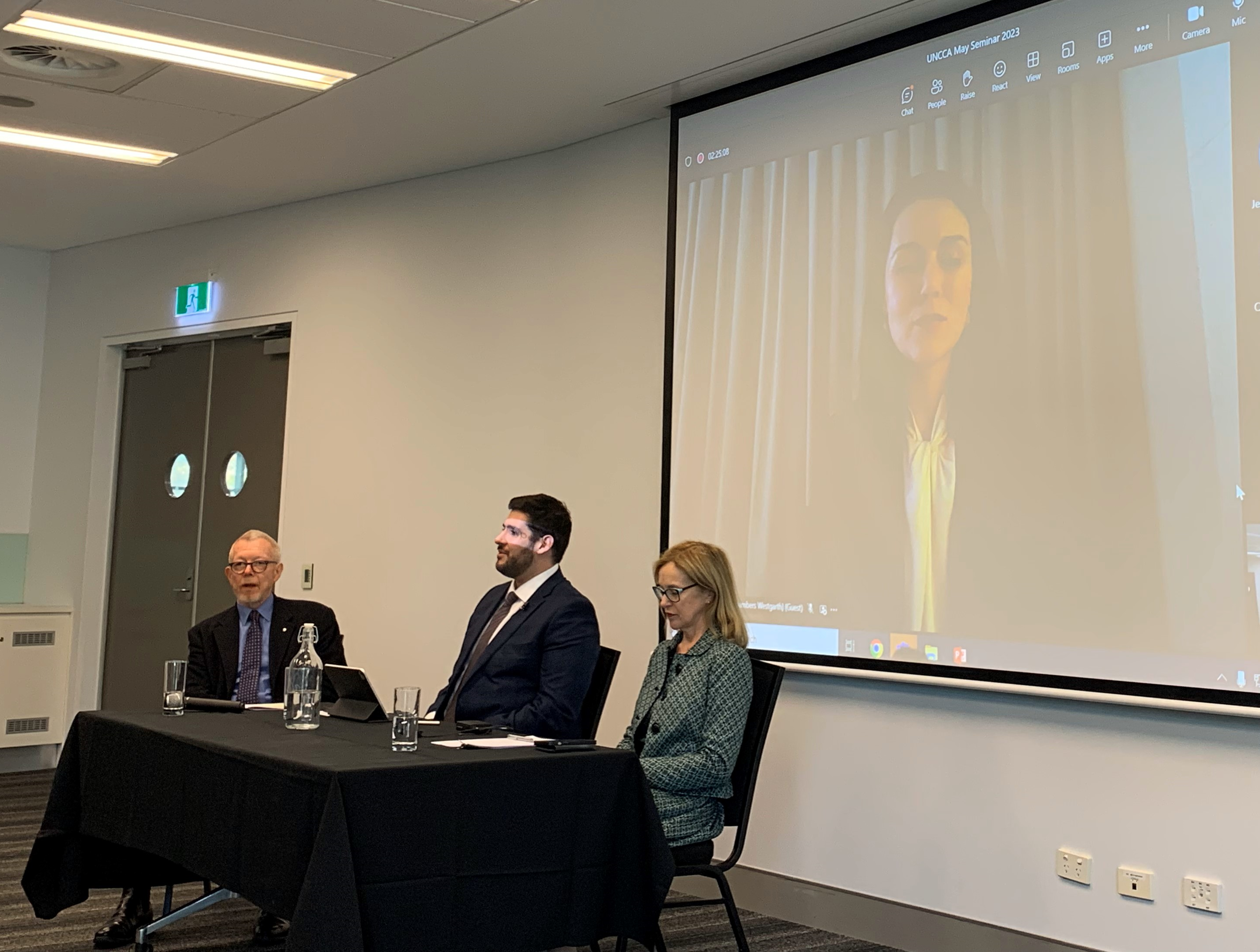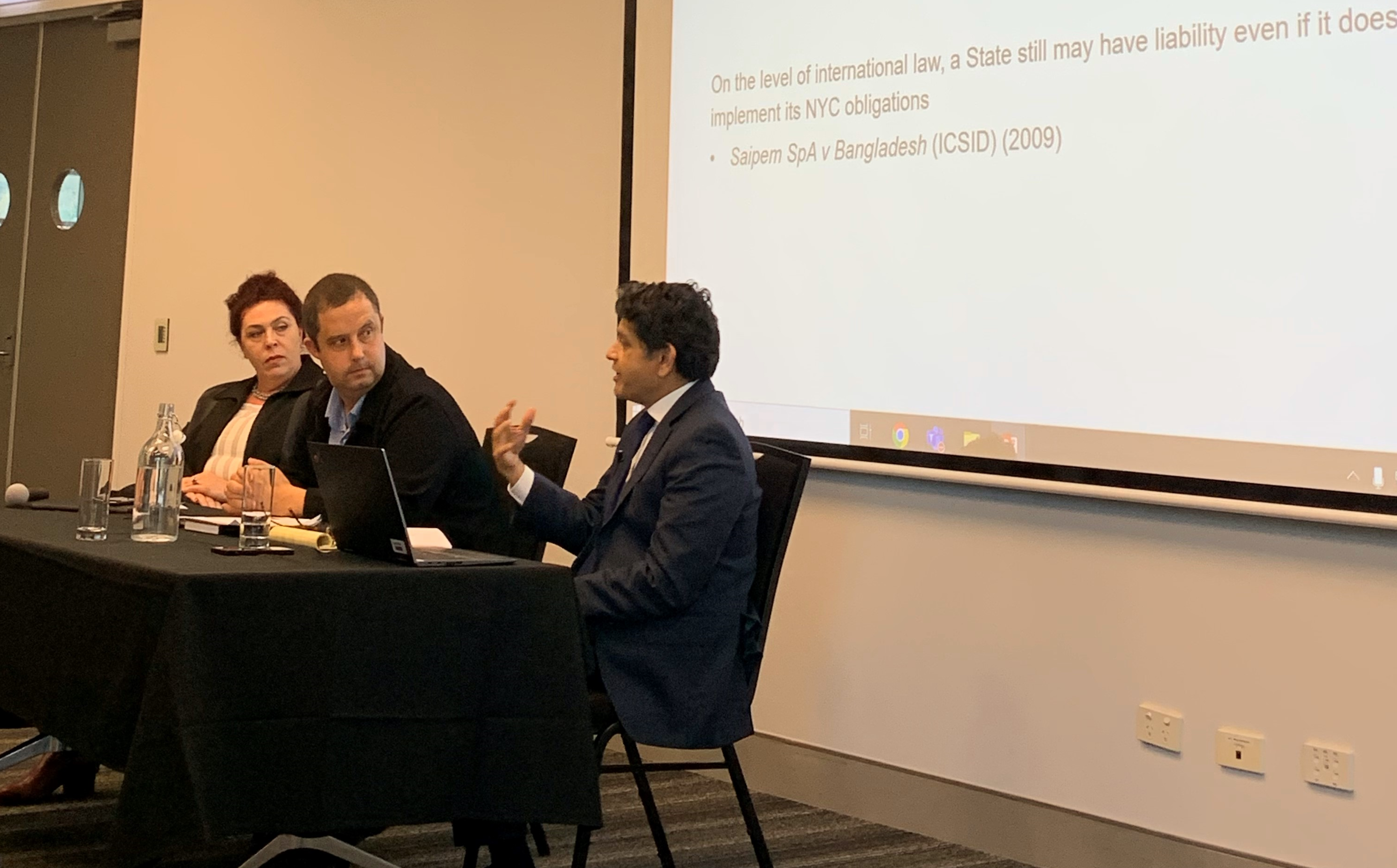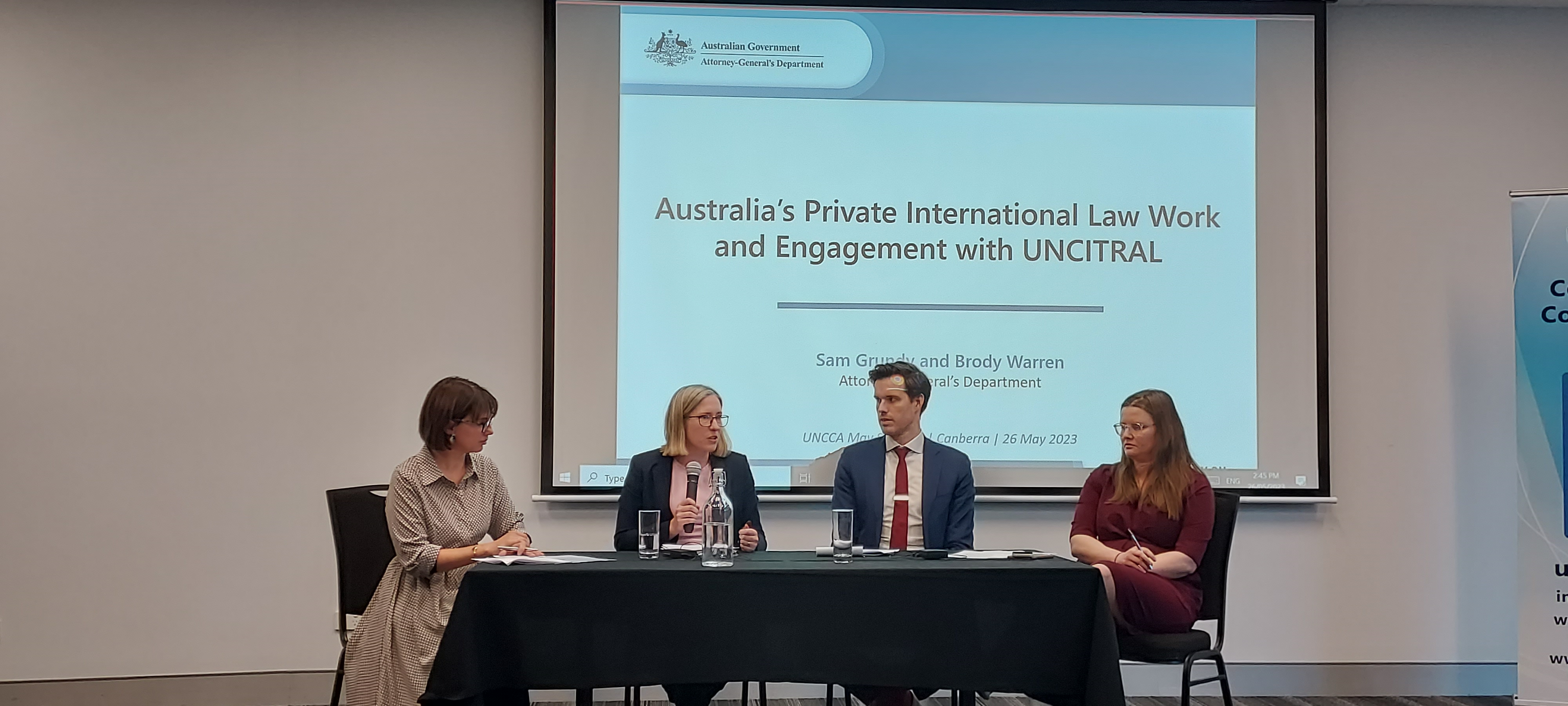On Friday, 26 May 2023, the UNCITRAL National Coordination Committee for Australia (UNCCA) hosted its eighth annual May Seminar at the University of Canberra. This event, which took the form of a full-day conference, saw participants from all over Australia in the fields of government, private practice, and academia, spanning from students to eminent practitioners. The theme of this year’s seminar was on the 65th anniversary of the New York Convention on the Recognition and Enforcement of Foreign Arbitral Awards (New York Convention or Convention), which aligns with the mandate of the United Nations Commission on International Trade Law (UNCITRAL) Working Group (WG) II.
Special Address and Keynote
The day began with an introduction by the UNCCA Chair, the Hon. Justice Brigitte Markovic (Federal Court of Australia). She then introduced a pre-recorded address from the Secretary of UNCITRAL, Ms Anna Joubin-Bret. In her address, Ms Joubin-Bret spoke of the New York Convention’s success, with currently 172 state parties. She also spoke of UNCCA’s work in the Asia-Pacific, and its connection to recent developments in this region which further the consistent interpretation and application of the Convention. She also provided updates on the recent work of UNCITRAL Working Groups, including the codes of conduct for practitioners and judges, created by WG III.

The Hon. Justice Kevin Lyons (Supreme Court of Victoria) delivered the keynote speech, beginning with an introduction to the long history of arbitration. Justice Lyons explained that prior to the New York Convention, there was a real and substantial problem of enforcing foreign arbitral awards as enforcement often depended on domestic laws. Opened for signature on 10 June 1958, the Convention supplanted previous unsatisfactory attempts to create a system for the enforcement of foreign arbitral awards including the Geneva Protocol on Arbitration Clauses of 1923 and the Geneva Convention on the Execution of Foreign Arbitral Awards of 1927. With its two primary objectives of giving effect to and enforcing foreign arbitral awards, the Convention resulted in the progressive unification of international arbitration law and has had a huge impact globally.
Justice Lyons also provided insight into the five clear and concise grounds provided by Article V(1) of the Convention for refusing recognition and enforcement of an arbitral award. He quoted the Hon. Justice Clyde Croft who said that without uniformity in the application of the Convention, the international arbitration system would not be a system at all. Justice Lyons’ keynote was then quite fittingly followed by commentary by the Hon. Justice Croft himself, who provided insights from his attendance at WG II sessions in New York. Justice Croft suggested that the simple nature of the Convention, which operates as a series of guiding principles setting out basic requirements, is likely one of the reasons for its widespread adoption.
Session I – Celebrating the 65th Anniversary of the New York Convention

This panel discussion was chaired by the Hon. Justice Croft. Dr Drossos Stamboulakis (Senior Lecturer, Monash University) firstly spoke about the discretionary approach taken by local jurisdictions in the days before the conception of the New York Convention. He discussed how the Convention adopts a ‘minimum standards’ approach – if the criteria as set out in the Convention are met, an award must be given effect unless it is exempt on the grounds outlined therein. Such approach is one of the Convention’s positive attributes and avoids what Dr Stamboulakis described as the ‘quagmire approach’ of trying to figure out which awards are enforced. Dr Stamboulakis also discussed the conflicting commentary surrounding the Convention: on one hand, it is presented as unreliable, unpredictable, and inconsistent because of the wiggle room it allows while on the other hand it is lauded for its simple and efficient language which has stood the test of time.
Mrs Bronwyn Lincoln (Partner, Thomson Geer) then discussed the developments in the laws of various jurisdictions globally that may impact the application of the Convention. She described the interrelated nature of enforcing arbitration agreements and foreign arbitral awards, with the former underpinning the latter. She referred to judicial commentary commending international arbitration as a vitally important partner of international business. Mrs Lincoln shared some reflections on the relevance of the UNCITRAL Model Law on International Commercial Arbitration (Model Law) to defining arbitration agreements. She discussed the possible extension of arbitration agreements to third parties and proposed, based on emerging case law, that this could enhance the international dispute resolution process.
The panel concluded with Ms Nastasja Suhadolnik (Head of Arbitration, Corrs Chambers Westgarth) joining virtually to share her insights on the relationship between the New York Convention and the International Centre for Settlement of Investment Disputes (ICSID) Convention. She said that whilst the ICSID Convention may provide easier enforcement mechanisms as it lacks an equivalent to Article V, there is a significant lack of enforcement under the ICSID Convention, showing the need for the New York Convention’s approach. Ms Suhadolnik then analysed whether investment treaty awards relate to disputes arising out of commercial relationships within the meaning of Article I(3) of the New York Convention. Secondly, she analysed the current reform undertaken by WG III and the possible introduction of bilateral tribunals. She then presented issues of jurisdictional immunity and the tension between the conventions whereby conduct of domestic courts under the New York Convention can lead to investment treaty claims.
Session II – International Arbitration in Asia & the Pacific

This session focused on the application of the New York Convention in the Asia-Pacific region and was chaired by Dr Dalma Demeter (independent consultant, arbitrator, and academic). Presentations started with a pre-recorded address from Ms Athita Komindr, Head of the UNCITRAL Regional Centre for Asia and the Pacific (RCAP). Ms Komindr began by introducing RCAP and acknowledging UNCCA’s continued relationship with the centre. She explained how RCAP furthers the implementation of UNCITRAL’s mandate in the region by providing technical assistance and capacity building, leading to greater adoption of the Model Law in the Asia-Pacific region. Ms Komindr detailed recent regional cases and highlighted the CLOUT database, before speaking about upcoming events and opportunities to intern at RCAP.
The panel then continued with Dr Benjamin Hayward (Senior Lecturer, Monash Business School) who spoke about developments in arbitration and the Model Law over time. While advocating for Australian law to become more ‘internationalised’, Dr Hayward explained that the frequency (or lack thereof) of international cases that are heard in Australia is a barrier. Instead, Australian courts look to Singapore, New Zealand, and Hong Kong decisions for an international perspective when seeking guidance on interpreting the New York Convention. He also spoke about the Australian International Arbitration Act 1974 (IAA) by which the New York Convention was implemented in Australia.
Mr Romesh Weeramantry (Special Counsel, Clifford Chance) then elaborated on the domestic implementation of the Convention in the Asia Pacific region. He explained how a state may still be bound by the New York Convention even if it has not fully implemented it after ratification. He also contrasted Australia’s implementation of the Convention through sections 7-9 of the IAA to implementation through national instruments like the Korean Arbitration Act, which simply mandates the application of the Convention in Article 39(1). Finally, Mr Weeramantry cited some implementation challenges including examples such as the Philippines, which ratified the Convention in 1967 but only implemented the Convention into domestic legislation in 2004; Indonesia, which has excessively formal requirements for enforcement; and China which has changed the wording of ‘enforcement of an award may be refused’ to ‘enforcement of an award shall be refused’ when enacting the Convention into its domestic legislation (emphasis added).
Session III – Updates on Current Works in International Trade Law

The final session was chaired by Dr Jessica Viven-Wilksch (Deputy Chair, UNCCA). The panel consisted of Miss Samantha Grundy and Mr Brody Warren from the Private International and Commercial Law Section of the Attorney General’s Department (AGD) and Ms Rhianna Benjamin (Director of the Investment Law Section, Trade and Investment Law Division, Department of Foreign Affairs and Trade (DFAT)). This panel shared insights into the interactions between the Australian government and UNCITRAL, with speakers describing the work of AGD and DFAT in the private international law and arbitration space. This was then followed by other updates on the various UNCITRAL Working Groups.
Conclusion
Overall, this successful event allowed participants to reflect on the Convention and the internationalisation of commercial arbitration. Panel discussions presented new legal challenges that are certain to attract further commentary on what is undeniably a very important text in international trade law.
________________________
To make sure you do not miss out on regular updates from the Kluwer Arbitration Blog, please subscribe here. To submit a proposal for a blog post, please consult our Editorial Guidelines.


